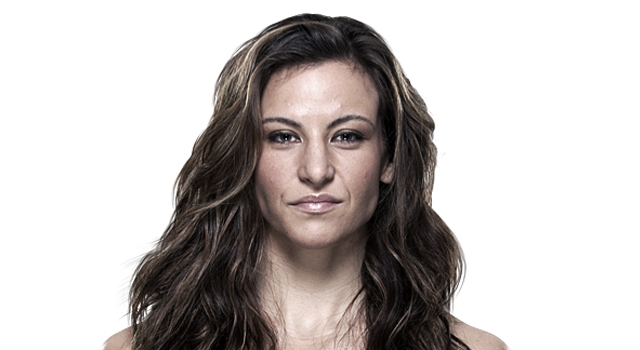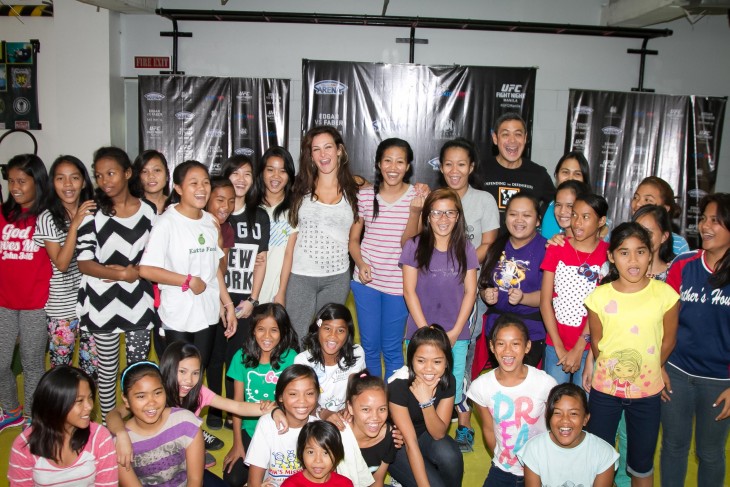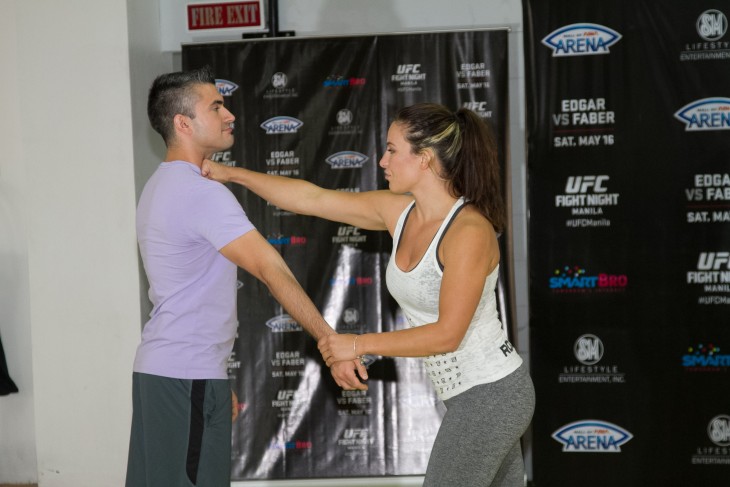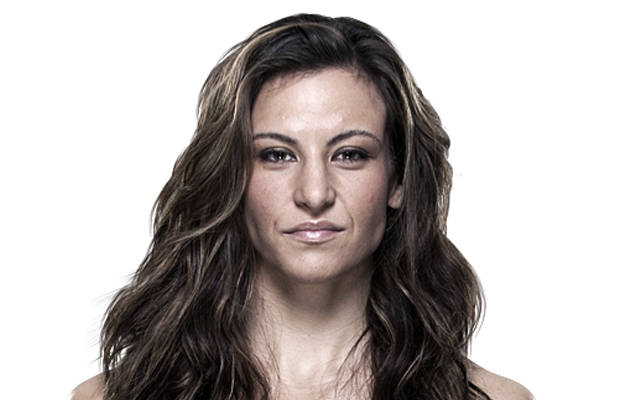Liana Smith Bautista is an article writer, web content manager,…
Warrior women in history have always intrigued me, and when offered the chance to get a quick interview with modern-day warrior woman and Ultimate Fighting Championship (UFC) fighter Miesha Tate, I was definitely excited. I was somewhat familiar with the sport of mixed martial arts (MMA), but the only female fighters I knew of were the ones who’d been featured in movies like those in the Fast and the Furious franchise. But how much of that awesomeness was movie-making, and how much was real life?
Quite a bit of it, if my interview with Miesha was anything to go by—not to mention her next televised UFC fight, scheduled for Saturday, July 25. In the Philippines, this will air in the morning of Sunday, July 26, on BALLS (Channel 34).

She was here for a quick trip to support fellow UFC fighters in mid-May, and during her stay here, she took some time out to teach a class on defending yourself against potential assailants. The event had been organized by the UFC organization, SM Lifestyle Entertainment Inc., and nonprofit organization Called to Rescue in order to help empower women and children and encourage them to stand up to would-be aggressors. Miesha taught a class of 30 underprivileged kids and women a few of her tried-and-true techniques on holding off and entrapping potential captors.
As it turns out, Miesha welcomed the chance to hold a class just like this one while she was here. “Whenever I have the opportunity, I like to speak to women and children and educate them about mixed martial arts, and about, you know, women and being empowered in general, so I like to do that any chance I get.”

Fighting Fit in a Male-Dominated Sport
The 28-year-old fighter is in a great position to advocate both her sport and the importance of being able to hold your own against men. She’s ranked second in UFC’s Women Bantamweight category. Her nickname might be “Cupcake,” and I didn’t get the chance to know enough about her to talk about her sweetness, but from what she demonstrated, she is certainly anything but fluffy.
Miesha first got into fighting as an amateur wrestler in high school, where she joined the boys’ team and won the title at the girls’ state championship level. In college, she joined an MMA club and was immediately drawn to Brazilian jiu-jitsu, which she eventually earned a purple belt in. She turned pro in 2007 and has climbed the ranks to the point where she’s now considered one of the top female pound-for-pound mixed martial artists in the world.
Intrigued by her history, I asked her what inspired her to join a sport that appears male-dominated. “I think the thing is is that I never really looked at myself differently, honestly. I always just thought, if a man could do it, then I could do it too and I never stopped to think that I shouldn’t because I’m a female. So, it’s a just a thought that didn’t cross my mind, really, and I wanted to try it, so I did, regardless of my gender, I just did.” She answered my question with a shrug and a smile, as if it wasn’t a big deal—because to her, I guess, it really wasn’t.
She did acknowledge that there are generally more men practicing the sport than women, but the numbers she then proceeded to give me showed a smaller gap than I’d expected. “For me, I’d say it’s about, 60% men and 40% women. You know, at my gym, I’m trying to create a women’s team, so I’m trying to get more high-level women to come in and train so I’m always recruiting more girls. We have quite a few, you know, high-level female talent that I’m fortunate enough to be able to train with, so I get more access to training with really strong and technical women than maybe most [others do].”

MMA Disciplines & Women’s Self-Defense
Of course, when it comes to which disciplines in MMA are best suited to women, there are physiological considerations to make, like upper body strength. There are psychological ones too, Miesha shared, but any woman who’s serious about the sport will be quick to get over these.
“I think jiu-jitsu is the most female-friendly, honestly, but it’s also the most uncomfortable for women to start, because they have to understand, they have to get over the not being comfortable with a man grabbing or touching and like moving them around, because it is on grappling, it happens on the ground. Some women get really nervous about, like, just even that kind of physical contact with a man.”
Yet this self-same awkwardness makes it all the more important to learn disciplines like jiu-jitsu, Miesha said. “It is the best for self-defense. You get comfortable having someone in those kinds of weird positions that you may find yourself if you were in a rape scenario, and you learn how to defend yourself from those positions.
“Most attackers, when they attack women, they want to take them to the ground, right? They don’t stay standing, you know, they grab them by their hair and throw them on the ground, so it’s a really good place to defend yourself, you know, to know how to defend yourself from there is important, and women do really well with it, because it’s more about leverage than it is about strength, and women do very well with leverage, and the fact that we’re more flexible. We also tend to better in a lot of the submissions because we have more flexibility.”
Miesha used herself as an example to illustrate her point: “I definitely think that if I was to get into some kind an altercation, that I would be better able to defend myself better, and than someone who was never trained. So I would feel really sorry for the man that tried to attack me, because I’m pretty sure that I would embarrass him.” Having seen videos of Miesha in action, we have no doubt that this would be the case.
But it’s not just about being physically able to defend yourself, Miesha was quick to point out, although this alone gives you a lot of confidence and a sense of your own power. “You know, it’s good for women to have that, and half of it is just believing in yourself. That’s some of it, I think, from what I’ve been told here, and kinda what I see, is that a lot of the young girls are very meek, and the culture here is very, you know, to listen to your elders, very respectful, and that is good unless you’re in an altercation where someone’s trying to hurt you. And that, they need to understand that it’s okay to stand up for themselves and it’s okay for them to fight back in these situations.”
[crp]
Training Your Mind and Body
Miesha definitely recommends taking up MMA as a confidence booster. “I think, just making up your mind that you’re gonna do it, so you stick to that plan, and then once you go in there and you do it, you will gain confidence every day that you go, because your skillset will build, and you will learn more and you will feel stronger and you’ll feel accomplished, and I think the mental, it’s like a snowball effect. You know, just keeps going and building the more that you go and the more that you do it.” She also wants people to understand the discipline of martial arts. “There’s a misconception that we’re all just angry people that wanna beat people up. That’s not the case at all, you know, we come in there and we learn this as a very respectful form of martial arts, in some case, it’s self-defense. So, I think, for some people who maybe have attention deficit disorder, or you know, like, just feel like more aggressive people, they can come in there and they can learn how to control that, and I think that that is the discipline of the art. You have to learn that and you have to understand that in order to not hurt your training partners, you know, and things like that, so we definitely encourage that and we practice that any time that we’re in the training room, that it’s a controlled and healthy atmosphere.”
How to Get Started with MMA
I asked Miesha to share a few tips on what interested parties without any prior experience in martial arts should do to get started.
“I think just finding a gym, just get out there and try it, that’s the biggest thing. Some people are like, ‘Oh, I’m really scared to try it, I don’t think I can do it.’ You don’t know unless you try it. So, there’s a lot of things in my life I’ve done that I was scared to do, but I realized that I was going to do it anyways, even if I was a little bit intimidated or I was scared, I was like, ‘I don’t care, I’m gonna try it anyways, I’m gonna get out of my comfort zone.’ And for most people, I think that’s what it is, it’s like, just getting in the door to try it, to make up your mind that you’re gonna do it.”
And when I asked her about researching on disciplines, she just smiled and said, “Well, I think trying to find what’s the best recommended school is always good. But, you know, trying something is better than not trying at all. You may not have access to the best school, the best facility, but as long as the people are safe in there, you know, they’re not having any really bad practices, then I think it’s fine. Anywhere that you go is better than doing nothing.
“[MMA is] good for everyone, at any age, any physical condition, there’s some form of martial arts for sure, because it’s such a wide variety of things that you can do, everything from kickboxing, even just cardio kickboxing to jiu-jitsu to wrestling to full MMA fighting. You know, there’s something for everyone.
“So I think that the whole family could go and do it, and I think for girls, especially that are new to it, like I said, they’re uncomfortable being in those weird positions with a male at first. Sometimes, maybe if they went and had another female partner to go with, then at least they have that support, but they will have to get over that eventually, and have to step out of that comfort zone, because, you know, the other female doesn’t know anything either, you just go at each other, you don’t learn, you have to go with people who are better than you, and that’s probably gonna be males, you know, so it’s good to have the support system, but you need to understand that eventually, you have to start training with the guys too.”
Fighting Forward
And what’s next for Miesha? She already mentioned her plans of coming up with an all-female team based out of her gym in Las Vegas, where she makes her home. There’s also that upcoming fight against Jessica Eye. A victory on Saturday (Sunday our time) could give her a shot at the UFC Bantamweight belt and a third fight against women’s bantamweight champion Ronda “Rowdy” Rousey. And there’s MMA-to-movie magic, too; we recently read that she’ll be part of the cast of the female-focused Fight Valley, a spinoff inspired by that cult classic starring Edward Norton and Brad Pitt, Fight Club.
Learn more about Miesha, her efforts to educate women about self-defense and MMA, and her progress as she gets ready for each fight by checking out her website, www.mieshatate.com, and her UFC.com fighter page. You can also Like her Facebook fan page and follow her on Instagram and Twitter as @MieshaTate.
What's Your Reaction?
Liana Smith Bautista is an article writer, web content manager, manuscript copy editor, and blogger—and she thinks it's awesome that she earns her living marketing on her love for the written word.

